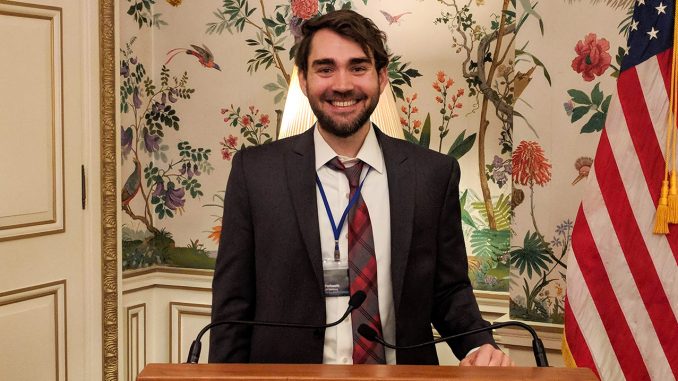
At least twice per year, Eric Perinovic would visit the National Museum of the U.S. Air Force with his grandfather.
The museum was at the Wright-Patterson Air Force Base near Dayton, Ohio, where Perinovic’s grandfather worked after being discharged as a staff sergeant in the United States Air Force.
Perinovic, a fourth-year Ph.D. history student, will now take his childhood passion to the next level by working at Washington, D.C.’s Smithsonian National Air and Space Museum, which houses the world’s largest aviation and space collection.
Last month, Perinovic received the museum’s Guggenheim Fellowship, a competitive grant awarded to pre- and post-doctoral candidates studying aviation and space history. Starting in January 2020 with a $10,000 stipend, Perinovic will continue his research for his dissertation about West Germany rebuilding its military during the 1950s.
Guggenheim recipients spend three to 12 months researching their proposals at the museum and receive a stipend based on that period of time. Perinovic will spend four months. Fellows typically receive $30,000-$45,000 annually.
“I’m still processing it,” said Perinovic, a fourth-year history Ph.D. student who plans to graduate in Spring 2020. “It’s like a dream come true. I’ve wanted this one for a long time.”
Perinovic is researching the F-104 Starfighter at the University of Freiburg in southwest Germany. He will return to Philadelphia next month after being away from his wife Jenny and his 11-month-old daughter Eleanor since September 2018.
The United States, Great Britain and the Soviet Union ordered Germany to demilitarize at the 1945 Potsdam Conference after World War II ended, according to the U.S. Department of State. The U.S. and western European countries tried to limit Soviet expansion in 1949 through NATO, a mutual defense group, according to the History Channel. West Germany was invited into NATO six years later and purchased Lockheed F-104 Starfighters in 1958, according to Lockheed Martin, the aircraft’s manufacturer, according to the Pearl Harbor Aviation Museum.
Perinovic’s research focuses on the political response surrounding accidents involving the post-war German Air Force, Luftwaffe, and the F-104 Starfighter. He will have access to the National Air and Space Museum’s archives during his fellowship.
“The Starfighter [was] a disaster,” Perinovic said. “One hundred pilots died flying in training accidents. What jumps out at me is [the F-104] is a short term disaster, but from a long-term political and economic perspective, it’s a resounding success.”
Jay Lockenour, the chair of the history department and Perinovic’s thesis adviser, is an expert on this period of research.
“It was both a political crisis and military crisis,” Lockenour said. “What Eric, I think, is finding is that the way in which the German Air Force weathers this crisis is both evidence of a stable, legitimate state and part of an evolution that creates the stable state.”
The Guggenheim Fellowship will not be Perinovic’s first time studying this topic. He previously was one of 10 Temple University students awarded a Fulbright U.S. Student Program grant, which funds one academic year of research outside the U.S., for the 2018-19 school year.
Perinovic previously worked as a policy analyst at World Perspectives Inc., a consulting company in Arlington, Virginia for three years. In 2015, he returned to school to get back to his historical interests.
Barbara Gorka, the director of scholar development and fellowships advising at Temple, said Perinovic’s success in becoming a Fulbright scholar was because of his willingness to accept criticism and improve from it.
“It’s not easy to get this feedback from lots of different people, but some students, as painful as it might be, just run with it,” she said.
Pursuing a Ph.D., especially with two fellowships, takes special qualities that Perinovic displays, Lockenour said.
“It’s not the smartest people who get the Ph.D.s, but the people who have persistence and self-confidence and kind of entrepreneurial characteristics that Eric has that succeed,” Lockenour said.
Despite his success, Perinovic questioned his decision to return to school at first.
“My first couple of years of my Ph.D. program were definitely intellectually not as fulfilling sometimes,” Perinovic said. “Those years of slogging through this feeling like, ‘What am I doing? Why [did] I come back and do this?’ They now feel worth it.”


Congratulations to my great nephew Eric Perinovic. Both of his grandparents worked at Wright Patterson Air Force Base. They dearly loved Eric and his brother, Dan. They looked forward to their visits and Grandpa thoroughly enjoyed taking his boys to the museum. I found my visits to the museum very interesting. There was one of the Wright Brothers’ first planes suspended from a ceiling. WOW! What a wonderful feeling to be so close to that. I can understand Eric’s interest in aviation.